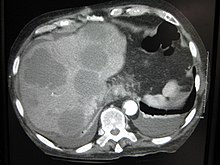Liver metastasis
| Classification according to ICD-10 | |
|---|---|
| C78.7 | Secondary malignant neoplasm of the liver |
| ICD-10 online (WHO version 2019) | |
A liver metastasis or liver filia is a malignant tumor settlement ( metastasis , secondary tumor ) in the liver .
A liver metastasis is not a tumor that arises from the liver cells themselves, but rather tumor cell clusters of other tissues that get stuck in the liver and continue to grow there. Since the liver acts as a blood filter through its capillary vessels , it is relatively often affected by metastases.
Symptoms
Liver metastases initially cause little or no discomfort. With extensive, increasing liver involvement, they can lead to ascites , congestion of the biliary tract and liver failure .
distribution
If you search carefully, you will usually find several metastases. Single metastases are rather rare. They can be visualized using ultrasound , CT and MRI .
Organs of origin
Tumors of the portal vein system in particular, such as stomach cancer , pancreatic cancer and colon cancer, often metastasize to the liver first, but liver metastases can also often be detected in other tumors - for example lung cancer . In breast cancer , liver metastases are rare and usually occur late in the course of the disease.
treatment
Ablative therapy
Liver metastases can be obliterated using high-frequency waves, freezing (cryotherapy) or electricity. This is possible both through the skin as an interventional radiological procedure and during a surgical abdominal opening.
Operative removal
Depending on the primary tumor, an attempt can be made to surgically remove liver metastases. If the primary tumor is also removed oncologically, the operation is the only way to achieve a cure.
Radiosurgery
With the radiosurgery , an alternative method is available, can be treated with the also otherwise inoperable tumors available in some centers.
chemotherapy
The goal of chemotherapy is to reduce the size of the tumor in the context of other therapies or to slow down tumor growth.
Individual evidence
- ^ Daniel T. Chang et al .: Stereotactic body radiotherapy for colorectal liver metastases. In: Cancer 117 , No. 17, 2011, pp. 4060-9. doi: 10.1002 / cncr.25997
Web links
- LICC study phase 2, information on vaccination against tumor cells after surgical removal of liver metastases (Mainz University Medical Center, Johannes Gutenberg University Mainz)
- Patient information on minimally invasive therapy of liver metastases (Charité Berlin)
- Study on a new treatment method for liver metastases in colon cancer . University Medical Center Schleswig-Holstein, September 25, 2012.


